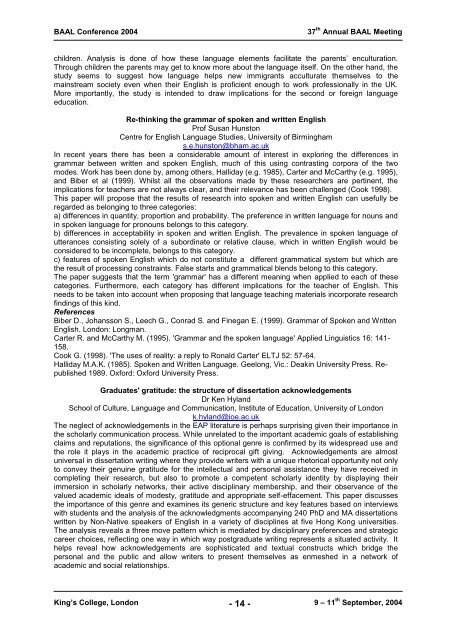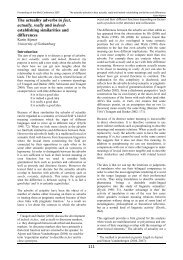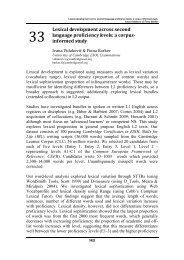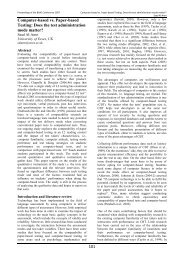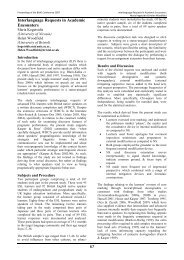Colloquia - British Association for Applied Linguistics
Colloquia - British Association for Applied Linguistics
Colloquia - British Association for Applied Linguistics
You also want an ePaper? Increase the reach of your titles
YUMPU automatically turns print PDFs into web optimized ePapers that Google loves.
BAAL Conference 2004 37 th Annual BAAL Meeting<br />
children. Analysis is done of how these language elements facilitate the parents‟ enculturation.<br />
Through children the parents may get to know more about the language itself. On the other hand, the<br />
study seems to suggest how language helps new immigrants acculturate themselves to the<br />
mainstream society even when their English is proficient enough to work professionally in the UK.<br />
More importantly, the study is intended to draw implications <strong>for</strong> the second or <strong>for</strong>eign language<br />
education.<br />
Re-thinking the grammar of spoken and written English<br />
Prof Susan Hunston<br />
Centre <strong>for</strong> English Language Studies, University of Birmingham<br />
s.e.hunston@bham.ac.uk<br />
In recent years there has been a considerable amount of interest in exploring the differences in<br />
grammar between written and spoken English, much of this using contrasting corpora of the two<br />
modes. Work has been done by, among others, Halliday (e.g. 1985), Carter and McCarthy (e.g. 1995),<br />
and Biber et al (1999). Whilst all the observations made by these researchers are pertinent, the<br />
implications <strong>for</strong> teachers are not always clear, and their relevance has been challenged (Cook 1998).<br />
This paper will propose that the results of research into spoken and written English can usefully be<br />
regarded as belonging to three categories:<br />
a) differences in quantity, proportion and probability. The preference in written language <strong>for</strong> nouns and<br />
in spoken language <strong>for</strong> pronouns belongs to this category.<br />
b) differences in acceptability in spoken and written English. The prevalence in spoken language of<br />
utterances consisting solely of a subordinate or relative clause, which in written English would be<br />
considered to be incomplete, belongs to this category.<br />
c) features of spoken English which do not constitute a different grammatical system but which are<br />
the result of processing constraints. False starts and grammatical blends belong to this category.<br />
The paper suggests that the term 'grammar' has a different meaning when applied to each of these<br />
categories. Furthermore, each category has different implications <strong>for</strong> the teacher of English. This<br />
needs to be taken into account when proposing that language teaching materials incorporate research<br />
findings of this kind.<br />
References<br />
Biber D., Johansson S., Leech G., Conrad S. and Finegan E. (1999). Grammar of Spoken and Written<br />
English. London: Longman.<br />
Carter R. and McCarthy M. (1995). 'Grammar and the spoken language' <strong>Applied</strong> <strong>Linguistics</strong> 16: 141-<br />
158.<br />
Cook G. (1998). 'The uses of reality: a reply to Ronald Carter' ELTJ 52: 57-64.<br />
Halliday M.A.K. (1985). Spoken and Written Language. Geelong, Vic.: Deakin University Press. Republished<br />
1989. Ox<strong>for</strong>d: Ox<strong>for</strong>d University Press.<br />
Graduates' gratitude: the structure of dissertation acknowledgements<br />
Dr Ken Hyland<br />
School of Culture, Language and Communication, Institute of Education, University of London<br />
k.hyland@ioe.ac.uk<br />
The neglect of acknowledgements in the EAP literature is perhaps surprising given their importance in<br />
the scholarly communication process. While unrelated to the important academic goals of establishing<br />
claims and reputations, the significance of this optional genre is confirmed by its widespread use and<br />
the role it plays in the academic practice of reciprocal gift giving. Acknowledgements are almost<br />
universal in dissertation writing where they provide writers with a unique rhetorical opportunity not only<br />
to convey their genuine gratitude <strong>for</strong> the intellectual and personal assistance they have received in<br />
completing their research, but also to promote a competent scholarly identity by displaying their<br />
immersion in scholarly networks, their active disciplinary membership, and their observance of the<br />
valued academic ideals of modesty, gratitude and appropriate self-effacement. This paper discusses<br />
the importance of this genre and examines its generic structure and key features based on interviews<br />
with students and the analysis of the acknowledgments accompanying 240 PhD and MA dissertations<br />
written by Non-Native speakers of English in a variety of disciplines at five Hong Kong universities.<br />
The analysis reveals a three move pattern which is mediated by disciplinary preferences and strategic<br />
career choices, reflecting one way in which way postgraduate writing represents a situated activity. It<br />
helps reveal how acknowledgements are sophisticated and textual constructs which bridge the<br />
personal and the public and allow writers to present themselves as enmeshed in a network of<br />
academic and social relationships.<br />
King‟s College, London 9 – 11 th - 14 -<br />
September, 2004


